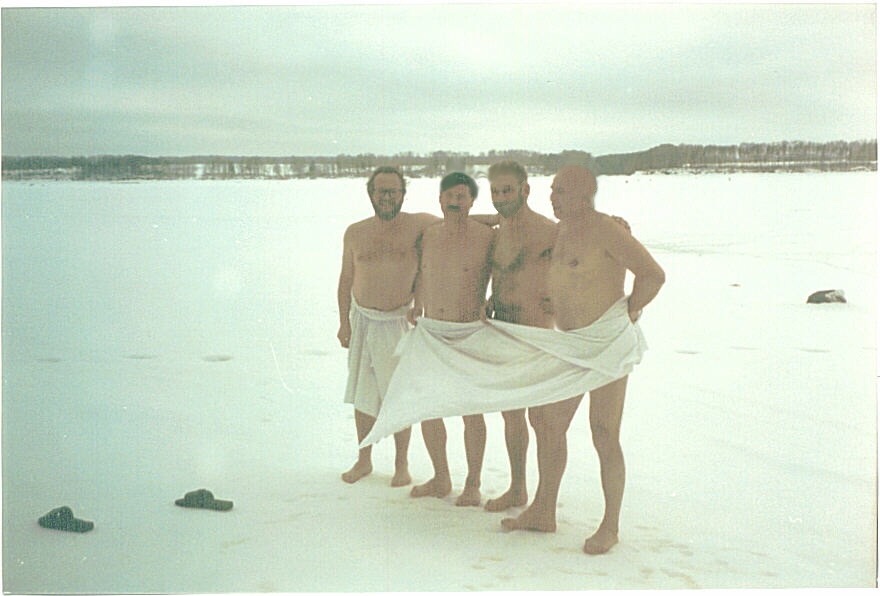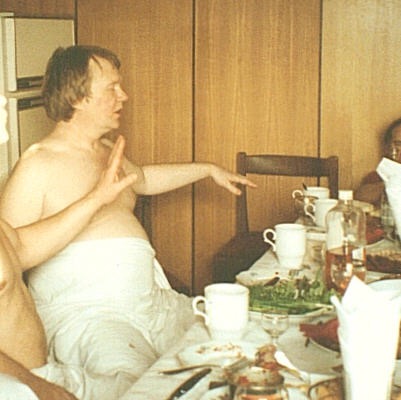I was a Potato Oligarch
Chapter One.

This is the Big One
I had my Russian Big One in a sauna on a missile base outside Moscow. When I have a great idea that is certain to make us rich I say to the family ‘This Is The Big One’. There had been many Big Ones over the years, all of which shrank into Little Ones. That afternoon I was with my friend Misha, suffering fifteen minutes of torture in the hot room before going back to the main purpose of the afternoon, a pigeon and mushroom hotpot and a litre of vodka. We had already worked through several varieties of smoked sturgeon, a wild boar sausage and a dish of fresh vegetables, flown in from the south by military aircraft. The base commander had a sideline in hiring out planes to Chechen traders who monopolised the city markets.
“So, John, what do you think of our poor Russia?”
“I love it, Meesh. I’ve never known anything like it. It’s revolution. Anything is possible. Everything is changing. There’s such energy.”
“Znachet, it is frenzy of fear. For you change is always good. For us change is always bad. To an optimist bedbugs smell like cognac. To a pessimist cognac smells like bedbugs.“
“Whatever. I wish I could get stuck in. It’s so exciting.”
He picked up a bucket of ice-cold water. I knew what he was going to do with it. I was keen to say something that would make him stop. I don’t like saunas. I don’t like the heat, the burning lungs, the eyes stinging with sweat, the hot wood on my bottom. I don’t like staccato conversation made inane by the stewing of brains. I don’t like macho men daring each other to pour water on the stove. And I especially don’t like them pouring it over my head.
“Misha, wait. I have an idea for a business. It’s a brilliant idea.”
It worked. He put the bucket down on his knee. I had to keep talking long enough for him to forget the water.
“What’s Russia famous for?”
“Znachet, caviar.” Znachet was a verbal tic, the equivalent of I mean or I guess
“Close.”
“Vodka.”
“Not what I’m thinking of.”
“Tchaikovsky. Dostoevsky.”
“Get back to food.”
“Cabbage.”
“Closer. What goes with cabbage?”
“Cabbage soup and kasha, food for Russia.” Kasha is buckwheat porridge, like semolina or American grits. The word alone was enough to start my stomach heaving.
“Come on. Potatoes. Russia grows a third of the world’s potatoes.”
“I must tell you there are already many people in potato growing business. Znachet, most of population.”
“I wasn’t thinking of growing them. I was thinking of selling them.”
“Sell potatoes to Russians? Why not snow to Eskimos? You don’t go to Tula with your samovar.”
“The British answer to McDonalds and Pizza Hut is baked potatoes. In their skin with cheese or baked beans or salad or stew. Potatoes are just a base for the filling. It’s one of my favourites.”
“You are half Irish.”
“Cut the stereotypes. You know who eats the most potatoes in Europe?”
“Germany.”
“Portugal. They eat as many per head as Russians.”


“Znachet, no Russian will go out for a potato. They can have that at home.”
“They can have chopped meat on a bun at home too. Russians don’t go to McDonalds for the food. They go for a slice of the West. Let’s open a Baked Potato Restaurant. A taste of Britain. Tradition, sophistication, elegance, bobbies outside the door, servers in bowler hats, cricket bats on the wall…
“…warm beer, rain, football hooligans…”
“…pictures of the Queen…”
“…and Fatcher…”
I would rather have a blown up colour photo of a salmonella bug in my restaurant than Her but I let it pass. I wiped my sweaty face on my sodden sheet. At least in Russian sauna you are spared nudity. Some tie their sheet over the shoulder like a toga. Some tie it over their breasts like a woman coming out of the shower. Others tuck it under their bellies like Sumo wrestlers. I favour Death of Socrates, under the breasts and over the belly. I had to keep talking.
“Everything is natural. Cheese and butter and sour cream and salad. And for the hot sauces we take a Russian stew and jazz it up with curry. Traditional English.”
“Znachet where is the gimmick? Where is the difference?”
“The staff could smile at the customers. That would be a Unique Selling Proposition.”
“The customers will think they are idiots.”
Russians smile a lot but not in front of strangers.
“Here’s the gimmick. You’ll love this Misha. We’ll make it a franchise operation. Individuals. Mom and Pop. Co-operatives. Anyone. You’re in the Small Business Business. You tell me how it works.”
“In Russia it will be very difficult.”
“You get paid to tell people how easy it is. Put your money where your mouth is. Pull this off and you can keep yourself in conferences for years. You might even get rich.”
“On potatoes?”
“It’s not potatoes, Misha, it’s the value added. The concept. The image. We’re dealing aspirations. We’re dealing dreams.”
“Russians have enough of dreams and aspiration. We had seventy years of them.”
“I don’t mean the Russians. I mean the do-gooders in the West. The Eurocrats. The Bureaucrats. Brussels. The British Know-How fund. Soros. We’ll have grants and subsidies coming out of our ears. Think of the feasibility studies. I sniff per diems in this, Misha. Per diems. What do you think?”
“Znachet, not a snowball’s chance.”